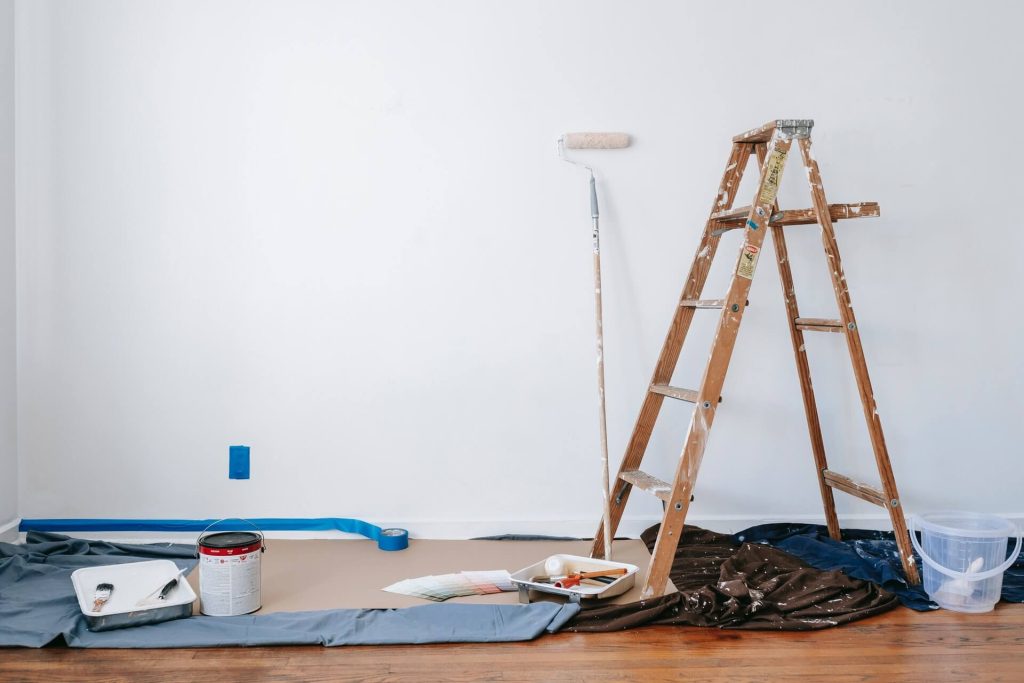For many, a new year means new beginnings. If you’re a homeowner, this could mean planning for a remodel or addition.
Here in Seattle, the market for home renovations has been very strong going back to at least 2014. Now with the COVID-19 pandemic making people reevaluate their living arrangements, demand for renovations has only gone through the roof!
Regardless of whether you wish to improve your living situation in space-constrained Seattle or build a new home on that empty rural lot you purchased away from the city, the process for good building is always the same—it begins with careful, thorough planning.
It’s a Process
Very few people have the opportunity to remodel a house more than a handful of times in their lives. Truthfully, for the vast majority it’s probably a once-in-a-lifetime occurrence. As you can imagine, then, the average person can be pretty clueless on where and how to begin.
Unfortunately, there are not very many comprehensive sources of information that help educate first-timers on how best to navigate the process. I’ve seen too many people ask for recommendations on social media for contractors and the like and can’t help but grimace when they are bombarded with useless information when they would better benefit from knowing about the process to make informed decisions. I mean, Sally Stranger can sing the praises of her #amazing contractor all she likes, but how can you trust that she’s not just a rube who wouldn’t recognize excellent work if it hit her in the face? (And believe me, social media is filled with rubes.)

Like I said before, the market for home renovations in Seattle is hot, and has been for some time. Add to that the supply chain, labor shortage, and inflation issues brought on by the pandemic, and you are looking at spending your hard-earned cash and quite a lot of time on an undertaking that is—even in the best case—extremely stressful.
Rather than rely on unvetted information on Facebook from everyone and their niece’s pet hamster, you (and your partner or family or whoever you are dragging into this endeavor) need to spend some quality time thinking deeply about what it is that you actually want to get out of a renovation.
Ask Tough Questions
One of the worst things homeowners can do is have vague ideas about what they want from a renovation and then immediately start meeting with contractors. People who do this are highly susceptible to being taken advantage of, overspending on a project, hiring the wrong people, getting left with unfinished or shoddy work, and getting a finished product that doesn’t meet their needs and desires.
Instead, I encourage you to take the time (and LOTS of it) to do some serious soul-searching and develop a concrete idea of what you want and why.
First, is a remodel or addition necessary? How much space do you actually need? Single homeowners and childless couples do not need as much space as families, of course. If you are trying to grow your family, it is often cheaper to simply buy a larger house that already has what you need than adding, say, a second floor or major addition.
Maybe the layout of your home is fine, but the fixtures and finishes are dated. In that case, it does not make sense to do major work when you can get by with only an interior refresh.
If the layout does feel problematic, is it because it is truly an impediment to your natural behaviors, or do you just want to follow current trends? Open concept floor plans are trendy now, but the charm of many older homes is their compartmentalized nature. If you and your family value privacy and separation, an open-concept plan may not serve you best. However, if you have to stumble through three bedrooms just to get to the bathroom in the middle of the night, then a new layout would clearly be a big lifestyle improvement.
Do you need an architect or engineer? In Washington state, plans for single-family residential projects of any size that include 4 dwelling units or less do not need to be prepared and sealed by an architect or engineer. Even so, projects requiring structural modifications would benefit from such expertise to ensure they are built to code.
These questions are not exhaustive. The point is, you need to have a STRONG idea of what you want and need before you ever reach out to a contractor. Certainly, architects or interior designers can help flesh out your concept, but you still need to bring them a well-considered intention, if not exactly a defined vision.

Take the time to really think about what you want and how you live. Compile images online or from magazines of ideas that you like. Let your imagination run wild and make your wishlist as comprehensive as possible. Don’t worry too much about costs or feasibility yet, as these considerations will come into play later.
Assemble Your Project Team
Renovation projects can be quite complex with many moving parts. You will be faced with hundreds of decisions throughout the process and some mistakes are inevitable. To reduce the number of possible mistakes, you will need to learn to manage risks and stand up for your priorities.
The work that you put in to define your concept is extremely important. Your concept is your lodestar, and you will need to refer back to it at every step of your remodel journey to ensure that your needs and wants are being met. When it’s time to move forward and assemble your team, your concept will facilitate communication with professionals and help you determine which are the best fit for you and your project.
The complexity of your project will ultimately determine the composition of your team. However, the list below gives an idea of the types of people you might expect to work with:
- Owner – This is you/your family. All decisions must ultimately come through you, since you are the one(s) supplying the money and concept to realize the project. Make sure that as a family, you are working together to incorporate and promote a shared vision. Negotiate any disagreements between yourselves privately and present only a unified front to your team. It’s good practice to designate one member of the household to be the primary point of contact.
- Bank – If you will not be self-financed, then you will need to obtain a construction loan from a bank. Make sure you fully understand all of the requirements and documentation needed to secure your loan.
- City – If your project requires permits, then you will need to obtain these from your local governing body. In Seattle, these are issued by the Department of Construction and Inspections. If your renovation will be in Seattle, I also encourage you to familiarize yourself with the aspects of the Seattle Residential Code and Existing Building Code pertaining to your project.
- Architect – Architects are design professionals licensed by each state to practice and provide stamped drawings. You can hire an architect in advance to produce a design, and then bid that design out to contractors later. This is the usual process, called Design-Bid-Build.
- Engineers – Engineers are design professionals licensed by each state to provide stamped drawings pertaining to construction systems (mechanical, HVAC, electrical, etc.) and structural safety.
- Cost Estimators – Hiring a third-party cost estimator is always a good idea to ensure that any estimate you receive is in line with the market.
- Decorators – Interior decorators (like myself) are design professionals concerned with finishing interior spaces. They consult on floor plans, space flows, colors, furnishings, window treatments, wall and floor coverings, fixtures, finishes, and more.
- Testing Services – Older structures, or those found in environmentally sensitive areas, may require testing services to clarify things like drainage, soil composition, toxic contamination, asbestos, lead, radon gas, etc.
- Project Managers – Homeowners can hire third-party project managers to oversee their project.
- General Contractor – The general contractor is a building professional tasked with hiring and coordinating the materials, equipment, labor and services needed to complete a construction project. General contractors may have their own project managers on staff to oversee daily site work. Some contractors offer what are called “Design-Build” services, which are sort of a one-stop shop bypassing the architect and doing the design in-house (Some homeowners think this saves money, but that really depends on a lot of important factors).
- Subcontractors – Subcontractors work under the general contractor and are typically tradespeople hired to perform specific tasks on a project, like hanging gypsum board, painting, etc.
- Suppliers – These are the vendors who provide materials for a project.
- Legal counsel – Hopefully, lawyers will only be needed to help answer questions like “Can I really build what I want here?” or to look over contracts for soundness. But don’t underestimate the need for a lawyer should things go badly.
Examine Your Budget
Paying for renovations is a significant concern for homeowners. The costs of renovations can range from the tens of thousands to the millions, depending on the project type and scope. Costs can add up quickly, so it’s important to develop a realistic budget for your remodeling project.
It is not uncommon for the final cost of a project to end up being slightly higher than the original contractor bid. Change orders and unforeseen circumstances will inevitably add to the cost. As a standard practice, homeowners are advised to budget a 10% contingency for unforeseen costs.
Additionally, make sure your budget covers the hiring of consultants like design professionals and project administrators if you will be employing such services. These costs can be treated as separate items, but should be at least considered within the scope of your total project budget.
Finally, if you do not have a second home, then you may need to consider the costs of a long-term rental while your project is underway at your primary residence. Very involved projects can take many months (and occasionally years) to complete, and many people underestimate the amount of stress caused by the constant noise, mess, and traffic that renovation projects entail.
Plan Well
There is an old proverb circulating that states “a goal without a plan is just a wish.” Such words of wisdom apply aptly to the venture of remodeling a house. A well-conceived plan unites vision, clarity, and intent and serves as both roadmap and benchmark for your project. Without a good plan, you may find yourself feeling around in the dark and advancing toward a final project that does not meet your expectations.
To recap, here are some useful guidelines to help you on your remodeling journey:
- Educate yourself before each step in the process – Don’t jump into a project blindly. It’s much more expensive to learn from mistakes due to ignorance than to be knowledgeable about what can go wrong and manage your project and budget accordingly. Informed decisions will lead to better outcomes for everyone involved.
- Put together a detailed plan – a solid plan is worth its weight in gold. It will establish the scope of your project and serve as a standard against which new decisions or changes can be made.
- Secure appropriate funding – It’s hard to know how much a remodel project will cost without establishing a good plan. Once your plan is in place, you will have better resolution on a target budget and can then determine if it is appropriate to self-finance or secure a loan. Don’t forget to set aside enough for incidental costs like contingencies, lodging, etc.
- Choose a good team – With a good plan in place, you will be able to make better decisions when assembling your team to make your project a reality. You will know which kind of expertise you need, and whether one company or service is better for your project than another. (For example, if one contractor only works on modern-style projects, when your project is more traditional, then you might choose someone more aligned with your project plan.)
- Be constantly vigilant – Unless you hire a trusted representative to oversee the project for you, you will need to remain vigilant to ensure that costs, timelines, financing, payouts, and the execution of your project meet your satisfaction. Ultimately, you hold the purse-strings and the final word, so make sure your project proceeds to your needs.
- Be involved, but allow people to do their jobs – Remodels are always stressful, but stress can be minimized by hiring the right people. Ultimately, a smooth working relationship requires trust. Your need to trust your team to execute your project according to your plans. That’s why a solid plan is so important. When your team has the freedom to work towards your plan as outlined, then communication becomes easier when complications arise.
Remodeling projects have many moving parts. Rather than moving forward with half-baked ideas and grasping at straws to find the right people to make your dream a reality, it’s better to begin by developing a good plan of action. With a settled plan, the rest of the pieces can fall into place more easily and lead you to a completed home renovation project that satisfies you for years.





